Changing Your Mind About Brain Health
Severe memory loss is not a normal part of aging as many people think. It’s the result of a brain injury, organic disorder or neurological condition like Alzheimer’s. Occasional memory lapses, on the other hand, are a normal part of growing old. As you age, the hippocampus gradually shrinks. Brain cells within it stop producing new neurons and disconnect from other cells. Blood flow, which supplies brain cells with oxygen, just isn’t what it used to be. However, researchers are excited about new evidence that normal memory loss isn’t necessarily permanent. The shrinkage can be reversed, and production of new brain cells can be stimulated by exercise and other healthy habits. That’s one more good reason to turn off Netflix and get off the couch.

It’s worth mentioning here that brains don’t fully mature until around age 25. That’s why it’s so important for even children and teenagers to be good to their brains. Head injuries and substance abuse interfere with normal development, and the resulting damage is tough to undo. The area of the brain that’s most affected by brain damage is responsible for language, planning, judgment, decision making and self-control. At any age, prioritize brain health.
The Benefits of Keeping Your Brain Sharp
A sharp, healthy brain has a positive impact throughout the mind and body. It keeps cognitive function, problem-solving skills and motor skills in shape. It keeps you focused but also helps you multitask. It strengthens memory and sparks creativity. It even boosts energy to keep you upbeat. For all those reasons, an alert, stimulated brain will do wonders for your productivity on the job.
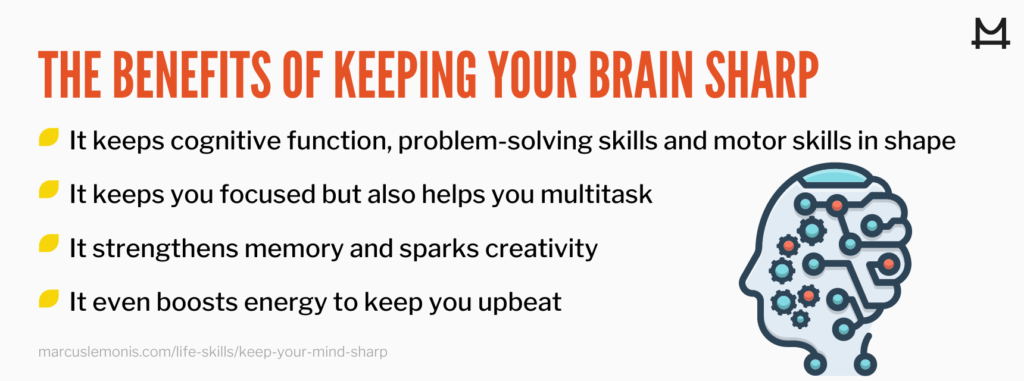
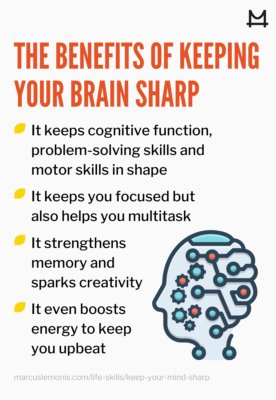
Helps for Boosting Brain Power
The year that Dirk Nowitzki led the Dallas Mavericks to a championship, he had a 90 percent free-throw rate. His signature jump shot was a work of art. Not coincidentally, Nowitzki was a notorious gym rat. He spent a mind-boggling amount of time shooting an equally mind-boggling number of free throws and jump shots in a row. Muscle memory served him well, but it didn’t come out of nowhere. He worked hard to develop and maintain it. In the same way, you can boost brainpower and improve memory by putting in the practice. Here are some tips:
Be a Lifelong Learner
As Marcus says, “You better be smart enough to be willing to learn.” Nothing snaps the brain to attention like learning new things. There’s an instant rush of the feel-good chemical dopamine. Each new bit of information triggers neurons to form new connections, so neural pathways become stronger. The more you learn, it seems, the more you’re capable of learning.

The greater the variety of stimulation, the happier your brain is. Working The New York Times Crossword every day won’t help that much. However, if you work the crossword, solve math puzzles, listen to unfamiliar music, take up new hobbies, play chess, enroll in classes and learn new skills, you’ll keep your brain firing on all cylinders. When you learn something new, though, avoid “cramming.” It’s more beneficial to study a little at a time and restudy what you learned after increasingly long intervals.

Exercise
Regular exercise keeps blood pumping to the brain. It also triggers a vital protein called brain-derived neurotrophic factor, or BDNF. BDNF strengthens neurons and ensures that neurotransmitters are sending messages accurately and on time. In short, it helps you think straight. There’s more. When you exercise, you get extra doses of serotonin and endorphins to reduce stress and boost your mood. If you’ve been down in the dumps for a while, get out there and exercise. Even periodically standing at your desk or taking an occasional stroll through your workplace helps.

Get Plenty of Sleep
Your brain does some of its most important work while you’re snoozing away. It is especially active in helping you remember things and prioritize your thoughts. A certain chemical called 4EBP2 organizes all those random thoughts and scraps of new information you picked up during the day. It ever so efficiently ranks them according to urgency. It “bookmarks,” so to speak, priority data. You need to remember that Christmas is two months away, but you don’t necessarily have to think about that tomorrow; your brain puts Christmas on the back burner. The vet appointment, on the other hand, is at 8:00 a.m., so that stays front and center. In this remarkable way, 4EBP2 works to economize your brain use. You don’t have to think about everything at once, so you can concentrate on what’s most important. If you didn’t sleep, your brain couldn’t do its job. Your life would be utterly chaotic.
Eat Healthy
There is increasing evidence that vitamins E and B and omega-3 fatty acids may help to ward off memory loss. Seafood, berries and vegetables, especially green leafy ones, protect brain health. The Mediterranean diet and a plan called DASH — Dietary Approaches to Stop Hypertension — have numerous brain benefits.
Don’t drink too much alcohol. Have you ever wondered what causes a hangover? Alcohol is dehydrating. Dehydration causes the membrane that encases your brain to shrink. Overuse of alcohol over time has a host of lingering effects that impact neurochemistry and brain function. It interferes with quality sleep, so memory takes a hit. A happy hour now and then shouldn’t do any long-term damage, but setting smart limits for yourself is one of the best ways to care for your brain.
Stay Socially Active
Researchers agree that people who spend time with friends, keep in touch with family, join clubs, volunteer and otherwise stay engaged have lower risk for memory loss. In fact, having a strong social network could prolong your life. Dozens of studies have revealed that people who isolate have a 50 percent higher rate of premature death.
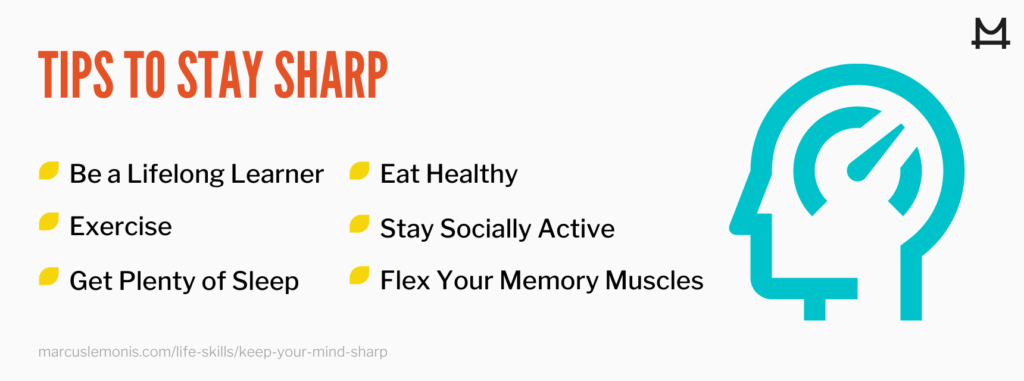
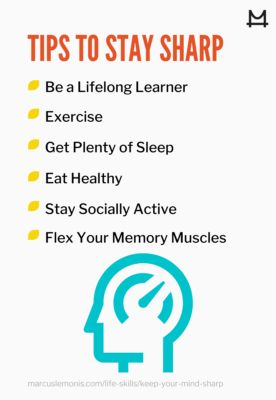
Flex Your Memory Muscles
There are all kinds of exercises for strengthening your memory. Repetition is one. Make a habit of repeating whatever it is you want to remember. If you’re introduced to a new co-worker, for example, say her name several times during the conversation: “Kat, how long have you been in marketing?” “Hi, I was just telling Kat that you two attended the same college.” Try to involve as many of the five senses as possible in memory-making. As you try to memorize a new recipe, concentrate on the aroma of each ingredient. Say each measurement out loud. At a party, note that Dylan is the one who sounds like a news anchor, wears Bleu de Chanel cologne and has a firm handshake. Another fun trick is to make your own mnemonics to remember lists. For instance, RICE is a mnemonic for how to treat limb injuries: rest, ice, compression and elevation. DART, say, might help you remember to pick up dry cleaning, place an Amazon order, pay rent and schedule a teeth cleaning. Teaching is a huge brain booster too. If you learn to install a ceiling fan, speak a foreign language or play the guitar, teach someone else to do it. It will reinforce your skills.
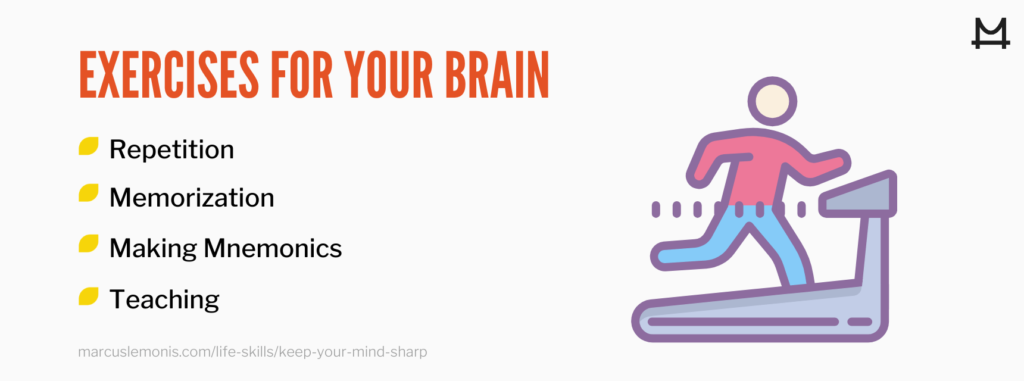
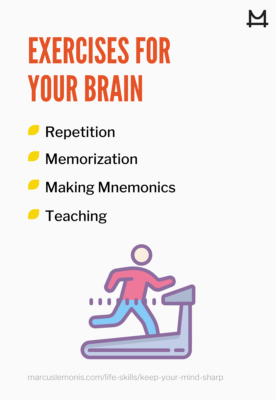
Neglecting your brain health is a little like neglecting to save for retirement. You could be setting yourself up for a poor quality of life down the road. Start working now to keep your brain sharp and prevent those “senior moments” in the future.
- What do you currently do to try and keep your mind sharp?
- What tips from above do you think can benefit you the most?
Health.Harvard.edu. (n.d.). 7 ways to keep your memory sharp at any age. Retrieved from https://www.health.harvard.edu/healthbeat/7-ways-to-keep-your-memory-sharp-at-any-age
QBI.uq.edu.au. (2017, November 17). Can you grow new brain cells? Retrieved from https://qbi.uq.edu.au/blog/2017/11/can-you-grow-new-brain-cells
Hamilton, J. (2014, November 20). Sleep’s link to learning and memory traced to brain chemistry. Retrieved from https://www.npr.org/sections/health-shots/2014/11/20/365213989/sleeps-link-to-learning-and-memory-traced-to-brain-chemistry
Health.Harvard.edu. (n.d.). An active social life may help you live longer. Retrieved from https://www.hsph.harvard.edu/news/hsph-in-the-news/active-social-life-longevity/
Hamilton, J. (2014, November 20). Sleep’s link to learning and memory traced to brain chemistry. Retrieved from https://www.npr.org/sections/health-shots/2014/11/20/365213989/sleeps-link-to-learning-and-memory-traced-to-brain-chemistry
Health.Harvard.edu. (n.d.). An active social life may help you live longer. Retrieved from https://www.hsph.harvard.edu/news/hsph-in-the-news/active-social-life-longevity/





